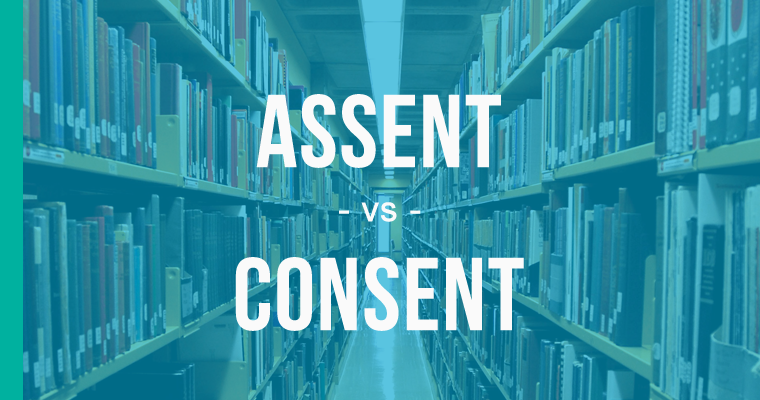Assent or Consent – How to Use Each Correctly

What’s the Difference Between Consent and Assent?
Contents
Consent and assent are two very similar words. They share the same pronunciation of their final syllable, and their definitions are almost the same. However, they have important differences in the connotation of each.
Consent is a verb that means to give permission or to agree to something. It can also act as a noun to mean permission or approval.
- The suspect consented to a search of his property by the police.
Assent is also a verb. It means to agree or concede. It can also act as a noun that means agreement.
- The woman nodded in assent. (agreement meaning)
Let’s look at the usage of these two words.
Using Consent in a Sentence
When to use consent: This word can act as either a verb or a noun. It can refer to permission or agreement. However, it has a stronger connotation of permission than agreement.
For example,
- Eighteen is the legal age of consent in most states.
- Researchers must get consent from their human subjects.
In legal and scientific contexts, consent has a more exact meaning. In those contexts, a person can only give consent, or permission, if they are 18 or older. If they agree, but are younger than 18, then they can only give assent. In these contexts, the person gives permission (or agreement) to sex, marriage, or a contract.
Consent also usually has the connotation of a different amount of power between the person granting permission (higher power) and the person receiving permission (lower power).
Using Assent in a Sentence
When to use assent: Assent can act as either a verb or a noun that refers to agreement or compliance. It usually refers to agreeing with an opinion.
For example,
- The politician gave a rousing speech and the crowd cheered its assent.
- The 17-year-old girl gave her assent to be part of the scientific study.
Assent has a connotation of enthusiastic agreement that consent does not.
Remembering Consent vs. Assent
One way to help you remember the difference between these words is to use the spelling.
Assent starts with an a, just like agreement. Assent usually has a stronger association with agreement than consent. The fact that assent and enthusiastic both start with vowels can also help you remember that assent can connote enthusiasm. Opinion also starts with a vowel. People often use assent to refer to an opinion, but never consent to an opinion.
Outside Examples
- Establishing a legal age of consent is one piece of a pending bill to address sexual violence and harassment in France. –Houston Chronicle
- The United States was founded on the idea that governments derive “their just powers from the consent of the governed.” –OC Register
- The Queen has granted royal assent to the article 50 bill, giving Theresa May the legal power to start Brexit negotiations with the European Union. –The Guardian
- Your mother is defensive about this dynamic, because she is an important part of the dynamic. Your brother could not behave this way without her assent. –Denver Post
Quiz: Consent vs. Assent
Instructions: Fill in the blank with the correct word, either consent or assent.
- It was easy to see that the union members supported their leader and agreed with her opinion. Their ____________ was audible.
- You are only twelve years old so you can’t legally get married. You haven’t yet reached the age of _______________.
- Without a warrant or probable cause, police must have the suspect’s ________________ if they want to do a search.
- The government only functions with the ________________ of the governed.
- The child readily gave his ____________ to participate in the study, but the researchers still needed the ___________ of his parents.
See answers below.
Article Summary
Should I use consent or assent? These words have some overlap in meaning. However, there are a few important distinctions which mean that the two words aren’t completely identical in their usage.
- Consent can be a noun or a verb. It can mean agreement, but it has a stronger connotation of permission. In legal contexts and when relating to scientific research, consent means agreement or permission from someone 18 years or older.
- Assent can also be a noun or a verb. It has a stronger connotation of agreement than permission. It usually refers to agreeing with an opinion, typically enthusiastically. In legal and scientific study contexts, it means a person agrees but is under the age of 18.
Remember to choose which of these words you want to use carefully, using the guidelines above.
Answers
- assent
- consent
- consent
- consent
- assent, consent
